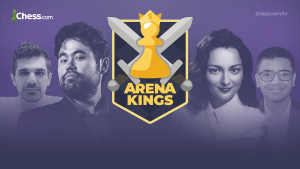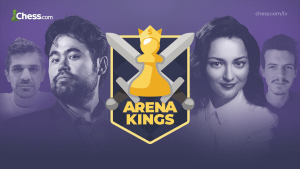
Study Plan For Advanced Players: Endgames
Target Skill Range: Advanced Path (Rated 1800-1999)
Tasks:
- Develop "endgame thinking."
- Master king activity in the endgame.
- Understand the winning and drawing chances of opposite-colored bishops.
- Improve your understanding of endgames with bishops versus knights.
- Improve your technique in conversion.
- Win rook and bishop versus rook.
- Learn the following theoretical rook endings.
Famed chess coach, IM Mark Dvoretsky, has asserted that more points are won and lost in the endgame than in any other phase of the game. That becomes truer and truer as your rating increases. How many times have you been mated lately? How many endgame points and half-points have you let slip through your hands? Hone some of the skills critical to playing endgames at the advanced level with these critical tasks.
1. Develop “endgame thinking.”
Endgames are fundamentally different from middlegames and openings. One must be proficient in applying “endgame thinking” to evaluate positions correctly. Rapid evaluation is imperative to quick assessment of complex tactical lines that simplify to complex endgames.
Improve your understanding of endgame thinking with GM Eugene Perelshteyn’s excellent series on “Practical Chess Endgames.”
Follow up with GM Melik Khachiyan’s series “How To Think In The Endgame.” You could not ask for a better coverage of the topic!
2. Master king activity in the endgame.
Follow up on your development of endgame thinking by digging in deep on the topic of king activity in the endgame. Arguably, the changing role of the king is the single most important characteristic that distinguishes the endgame from the middlegame.
King activity is of absolutely paramount importance, but danger still lurks. You must have a good sense for when you can activate your king safely. Master your king-activity-sense with GM Dejan Bojkov’s videos discussing king activity in rook endgames.
Follow up with Bojkov’s additional videos on king activity in other more complex endgames.
3. Understand the winning and drawing chances of opposite-colored bishops.
Even some rank beginners know that opposite-colored bishops lead to drawish positions. Opposite-colored bishop endgames are the last refuge for many a player in a difficult position, yet these endgames are often misplayed, and strong players frequently find winning chances missed by your average player.
Master both the winning and drawing techniques necessary to play these endgames at an advanced level with GM Alex Yermolinsky’s excellent series on the topic.
Follow up by completing Bojkov’s lesson on the topic.
Don't give up on your winning chances. Check out how GM Ben Finegold likes to win with opposite-colored bishops.
4. Improve your understanding of endgames with bishops versus knights.
Bishops and knights—Countless players have struggled with the strengths and weaknesses that come into such sharp conflict when these pieces do battle. The differences between these pieces comes into particularly sharp relief in the endgame when there is nothing to distract from them.
There’s no better way to master the differenc than by actually playing it out. Do so by completing GM Dejan Bojkov’s courses on the topic.
5. Improve your technique in conversion.
The mystical “they” say that the hardest thing in chess is to win a won game. Rubbish! Still, everyone knows the pain of letting a win slip our grasp when it was “just a matter of technique.” Let others learn the hard way for you by watching these videos on winning a won game by GM Alex Yermolinsky and GM Roman Dzindzichashvili.
Now put those skills to the test by completing the category “Advantages” in chess.com/drills.
6. Win rook and bishop versus rook.
Rook and bishop versus rook is one of those endgames that everyone “knows” is drawn, but when the rubber meets the road, countless players have faltered. First, learn to win the very best case scenario, the Philidor Position.
Next, show that you actually know how to draw against the beast that is Stockfish.
7. Learn the following theoretical rook endings.
It’s time to hone in and get to the bare bones of studying. Theoretical endgames are nobody’s favorite topic, but knowing the most important theoretical endgames back to front, front to back, and upside down is vital to playing endgames accurately. This skill is becoming even more valuable in the face of sudden death time controls where players have little left in the deeper reaches of the endgame.
No theoretical endgames are more important than theoretical rook endgames. Master these with the following Chess.com drills.






